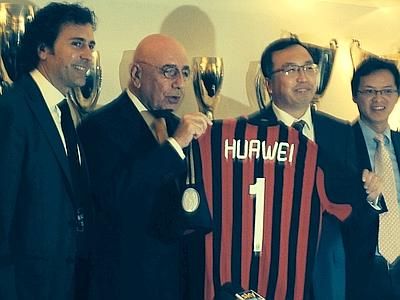
Huawei uses sports to combat politics

Huwaei have tied up with AC Milan
It’s almost becoming its own feature at this point: who has Huawei sponsored this week? This year the company has signed sponsorship deals with the ITU World Triathlon Grand Finale in London, German soccer team Borussia Dortmund, NZ soccer team Wellington Phoenix, and Australian rugby league side Canberra Raiders. Then there was a China-New Zealand soccer match, the 2011 Italian Super Cup in Beijing, plus Atletico Madrid in last year’s Madrid derby, and that’s before we get on to Huawei’s recent musical tie-ups with Coldplay and, er, the Jonas Brothers.
The latest team to take the company’s renminbi is Italian soccer giant AC Milan (one of the two teams who played that Super Cup match at the Bird’s Nest in 2011). Huawei has signed a three-year deal to become the Serie A club’s mobile partner and chief communications supplier. Significantly, Huawei can now use the AC Milan logo for marketing around the world.
It needs the PR help, because Chinese companies are, simply put, not trusted abroad. Here is my take for this week’s Sports Talk column. It was trimmed slightly in print, so I’ve reposted it in full below:
When Chinese telecoms firm Huawei signed a deal with the Wellington Phoenix soccer club in New Zealand earlier this year, the team released a video in which the players and coaches tried – and failed, to comic effect – to pronounce the name of their new sponsor. It was a clever piece of marketing by a company that is, at best, anonymous outside China and, at worst, seen as something altogether more sinister.
For those not up to date with their American politics, Huawei has effectively been designated persona non grata in the US, a status that will only have worsened in the light of the latest NSA spying revelations. The charge, in essence, is that Huawei’s purported links to the Chinese government and military make it too much of a risk to allow it into US infrastructure.
But the rest of the world sees it differently and Europe in particular has been only too happy to welcome the company in various facets of public life. The push has been most noticeable in the sporting arena.
In the last few days, Huawei was announced as a major sponsor of Italian soccer club AC Milan, after inking multi-year deals with German team Borussia Dortmund and Spanish soccer’s governing body earlier this year.
The latest deal was borne out of a partnership launched at the 2011 Italian Super Cup, which was played in Beijing, but Milan officials were perhaps oversold on the idea of what Huawei’s sponsorship at home could mean for the club abroad, judging by comments about the “fantastic commercial opportunities” they seem certain will follow in China.
Franchises around the world have been looking to expand their brands, with Asia a popular target for growth, and many in the sports industry have long seen Huawei as a company willing and able to part with a few million in sponsorship dollars.
But, in truth, these deals do more for Huawei in the long term than they do for the clubs in the short term. Shunned in the US and blocked in Australia, Huawei has employed the soft power avenue of sports to get its name first known, and then, it hopes, embraced overseas as it continues to expand globally.
Judging by the fact that around one-third of the world’s population is connected to networks that use its gear, Huawei already appears well on the way to global domination. Now it’s hoping sports will take it all the way there.
In terms of the AC Milan deal, former players and current club ambassadors Franco Baresi and Daniele Massaro were quoted as saying it was in the east where “the greatest part of our supporters are” and that they hope AC Milan can play “more and more matches in China.”
1. Sounds like they are confusing fans with followers, as Manchester United have previously done in China. Pretty sure they have more genuine supporters in Italy than in the east.
2. Also pretty sure that AC Milan won’t be playing in China in the near future, unless Huawei underwrites the trip. Foreign teams will continue to steer clear of China until the economics change.